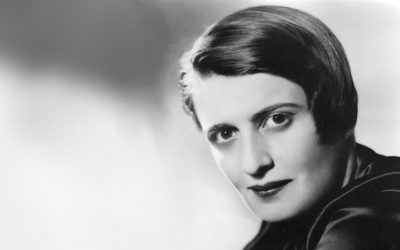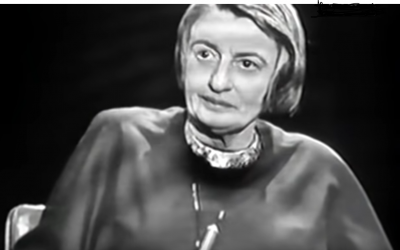This review was based on Dr. Locke’s book: The Illusion of Determinism: Why Free Will is Real and Causal. The book deals with these issues at greater length and includes additional topics such as the nature of the self and what free will is not. It also deals with the Libet experiments which are misinterpreted in Sam Harris’s book.
A review of Sam Harris’ “Free Will” By Edwin A. Locke
Sam Harris’s well-publicized attack on volition in his book Free Will is based on the assertion that in order to possess free will, you would have to, in effect, be omniscient, that is, know everything in your conscious and subconscious that plays any role in every choice you make, traced back infinitum.[1] This standard is totally arbitrary. It implies that you have to know everything before you can know anything.
The problem of determinism
But the problem for determinists is even worse. Determinism itself is a claim of knowledge. But how do determinists validate it? Since everything they believe is determined by causal forces they are not aware of and/or cannot control, how do they know it is true? They would have to confess that they were compelled by unknown or unknowable causal forces to believe it. But if so, they would also have to admit that advocates of free will were also forced to believe in free will. This would mean that any debate would be the equivalent of a contest between programmed robots. There is no way out of this contradiction–no way to tell who is right.
The late physicist, Stephen Hawking, was one of the few intellectuals who acknowledged this problem in his Brief History of Time, but he did not come up with a valid solution. To be taken seriously claims of determinism and free will both require validation. As noted, determinism is incompatible with its own content and cannot be validated.
Free will can.
To Harris’s credit, he was quite right to reject the arguments from compatibilism—have free will and eat it too- (an obvious contradiction) and random particle theory (which would not give anyone control of anything.) He is also right to reject religion which is based on faith and not reason. Free will has to be approached in a different way. A number of issues have to be addressed.
The relation between the brain and mind
The physical brain is our hardware. But the mind and brain cannot be identical because they have different attributes.
Physical objects possess size, color weight, and the like. But ideas do not. They have attributes that physical objects do not, such as correctness or error or doubt or certainty or confusion, or clarity. Thus, the mind must be an emergent property of a certain type of brain and nervous system.
The two levels of consciousness
Consciousness is our means of knowing reality. In humans, there are two interrelated aspects. We share with animals the capacity for sense perception which is the automatic result of physical energy striking sense organs and being processed by the brain. But unlike the lower animals, humans also possess the rational faculty, the ability to go one step further. They can integrate perceptual information to form concepts, the development of language is a core example. Words are symbols that stand for concepts.
Here is the critical point: raising one’s mind to the conceptual level is not automatic; it requires volitional effort.
Everyone can observe this. For example, when reading, the words are automatically perceived but their meaning may not be. The mind may drift away. The reader has to be in conscious focus or they will not know the meaning of what they are reading. Ayn Rand wrote that volition–free will–is the choice to think or not to think, meaning to be in conceptual focus vs. allowing the mind to drift at the level of sense perception.
The Conscious and the Subconscious
There are two main parts of the mind: the conscious (focal awareness) and the subconscious (i.e., storage or memory). The conscious mind can only hold about seven items in focal awareness at the same time. Both the lower animals and humans store information (experiences, learning, memory, etc.), or else past, conscious learning would be lost and the organism would not long survive.
Storing information in the subconscious leaves the conscious mind free to gain new knowledge. A human could not even carry on a simple conversation unless the meaning of some of the words was automatized based on prior learning. Information is “brought up” into awareness from the subconscious through automatic association or by a conscious, chosen purpose.
Automatic association is most easily observed in the realm of emotions which involve subconscious appraisals. When you meet a mother bear with cubs in the woods, your stored knowledge of bears with cubs and your current location might lead you to subconsciously perceive a threat and thereby experience fear. Emotions, however, can be changed by modifying the inputs such as your stored beliefs which could be erroneous. In the case of a chosen purpose, you may, for example, create plans for improving your business drawing on past experiences, your own research, and advice from experts.
Causality
“Hard scientists” assume that all causality is mechanical, a billiard ball model in which motion is caused by one ball striking another which then causes motion in another, and so on. This is a poor model. A cause is a thing acting.[2] Every existent acts in accordance with its nature, which in Aristotelian terms is known as the law of identity. An existent’s nature determines what it can or will do in a particular circumstance. Humans, unlike other species, have the power of a certain type of self-causation- they can choose to think and thereby make choices and thereby regulate their choices and actions. As Objectivist philosopher, Leonard Peikoff observes: “Volition is not an exception to the Law of Causality; it is a type of causation.”[3]
Free will does not involve either omniscience or omnipotence. Free will is a specific power based on the existence of the rational (conceptual) faculty. Free will (volition) is an emergent property of an advanced species. Observes philosopher Ayn Rand:
“Man exists and his mind exists. Both are part of nature, both possess a specific identity. The attribute of volition does not contradict the fact of identity, just as the existence of living organisms does not contradict the existence of inanimate matter. Living organisms possess the power of self-initiated motion, which inanimate matter does not possess; man’s consciousness possesses the power of self-initiated motion in the realm of cognition (thinking), which the consciousnesses of other living species do not possess. But just as animals are able to move only in accordance with the nature of their bodies, so man is able to initiate and direct his mental action only in accordance with the nature (the identity) of his consciousness. His volition is limited to his cognitive processes; he has the power to identify (and to conceive of rearranging) the elements of reality, but not the power to alter them. He has the power to use his cognitive faculty as its nature requires, but not the power to alter it nor to escape the consequences of its misuse. He has the power to suspend, evade, corrupt or subvert his perception of reality, but not the power to escape the existential and psychological disasters that follow. (The use or misuse of his cognitive faculty determines a man’s choice of values, which determine his emotions and his character. It is in this sense that man is a being of self-made soul.)” [4]
Harris claims to be baffled about why he does anything. Why could this be? Poor introspection? I have no trouble at all identifying the causal factors behind my actions.
The issue of the individual being a self-made soul brings us to the issue of criminal responsibility.
Criminal Responsibility
Harris believes (very reluctantly) that criminals should be incarcerated not because they are to blame for their crimes, which they could not help, but simply to protect the public. But how does a determinist decide which actions are crimes and which things are a danger to the public and what the punishments should be?
These decisions would have to be the result of unknown forces affecting lawgivers. How could there be any form of justice, especially since criminal punishment is unjust in principle?
A rational system would take account of issues like proven mental illness or brain damage which can make volition impossible but such distinctions are not relevant in a society that rejects free will on principle.
The philosophical status of the concept of free will
What is the philosophical status of the concept of free will?
Free will cannot be proven because it is the foundation of any proof of anything. Free will is an axiom, an undeniable base for everything we know. It is determinism and not free will that is an illusion.
References:
[1] Sam Harris, Free Will (2012).
[2] As I note in The Illusion of Determinism: Why Free Will is Real and Causal: “An entity’s attributes and characteristics determine what it can do or will do in any specific circumstance. Every entity has specific capacities or potentialities. “Causality is the law of identity applied to action” (Binswanger 1986; for this and other relevant quotes from Ayn Rand on causality). It is critical to note that causes are entities, not disembodied actions. A cause is a thing acting. Every action is the action of something.”
[3] Leonard Peikoff “The Analytic-Synthetic Dichotomy,” Introduction to Objectivist Epistemology, 110.
[4] Ayn Rand “The Metaphysical and the Man-Made, “Philosophy: Who Needs It, 26
First published on ObjectivismAynRand.com.



